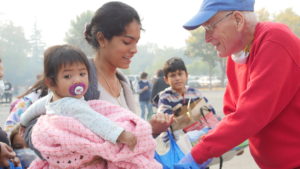
Mark Stevens (Right) a volunteer with St. Leo’s in Sonoma, hands out food during the Catholic church’s weekly Tuesday Food Pantry program in the wake of the Wine Country fires. Stevens and his wife Barbara took in a family of evacuees. (Photo by John Beck)
A Benicia filmmaker’s short documentary “Forgotten Fire Victims,” about how Wine Country farmworkers and day laborers had been affected by the Atlas and Tubbs fires in October, is being shown in several Sonoma-area theaters for the next few weeks.
John Beck has directed several documentaries, including two about the wine industry. His 2012 film “Harvest” told the stories of grape pickers in Sonoma County, and 2013’s “The Monks of Vina” featured a Trappist monastery and winery near Chico, and was aired on PBS last year. The idea to do “Forgotten Fire Victims” actually came from Lois Kazakoff, the deputy editorial page editor for the San Francisco Chronicle and a Benicia resident. She had seen “Harvest” at the Benicia Film Festival in 2015, and as the Chronicle was covering the impact of lower-income Latino communities after the fires broke out two years later, she wanted to reach out to Beck for a multimedia component.
“I hoped he would still have contacts among the immigrant workers and would be willing to make a short video for the Chronicle’s Opinion section on SFChronicle.com,” Kazakoff said via email.
Kazakoff was able to obtain Beck’s contact information through her friend Carolyn Plath, who had served as a chairwoman of the Benicia Film Festival in 2015, and the ball was rolling from there. After several years of working for local publications like Sonoma Magazine and the Santa Rosa Press Democrat, he had amassed a lot of contacts in Sonoma County. The film highlights various organizations that helped out in the wake of the fires, including St. Leo’s Catholic Church in Sonoma, the Sonoma County Fire Relief Fund and La Luz Bilingual Center in Sonoma, who provided meals, supplies and shelters to those displaced by the fires.
The movie also focuses on Latino families impacted by the fires, including a couple named Glafira and Rodrigo who lost their rental home in Santa Rosa and had to live out of their car with their three children— including a newborn— before they moved into Rodrigo’s mother’s living room. Glafira worked as a housekeeper and Rodrigo worked in a vineyard but now had to find new jobs.
“All the people I worked for were people with money,” Glafira said in the film. “They have a lot of mansions and all that stuff in Santa Rosa and also in Glen Ellen. So now I lost my job because all the houses where I used to work, they caught on fire.”
Beck also talked to a man named Augustin, who was looking for a new job after his rental home in Santa Rosa burned and was concerned his family would not qualify for federal assistance.
To combat this, the North Bay Organizing Project joined forces with various Sonoma County nonprofit organizations to establish UndocuFund, an agency aimed at providing assistance to undocumented families who had been displaced by the fires.
Beck also highlighted the volunteer efforts of organizations like St. Leo’s and La Luz. He said many of the interviewees were eager to speak about their situations.
“Most of them wanted to share their stories and the more we talked and the more I listened, the more they shared,” Beck said.
Beck was also inspired by the strength of the people involved.
“I’m always amazed at the resiliency of families,” he said, “and I was pleasantly surprised to see how the community stepped up, people at La Luz and St. Leo’s Church and Undocufund, to help them get back on their feet.”
The film was shot over the course of a day and uploaded to the Chronicle’s website, where it quickly became shared on social media. One person who happened to see it was Ky Boyd, the owner of Rialto Cinemas in Sebastapol. He asked Beck if he could screen it at his theaters, which Beck accepted. The film was initially intended to be screened before all movies at Rialto Sebastapol, Rialto El Cerrito and Rialto Elmwood in Berkeley as well as the Sebastiani Theatre in Sonoma. When an article on the film ran in the Press Democrat, other area movie theaters picked it up, leading to additional screenings before all movies at Roxy Stadium 14 and Airport Stadium 12 in Santa Rosa, and Raven Film Center in Healdsburg. The screenings began on Nov. 10 and will continue for the next few weeks.
Kazakoff is happy that Beck was able to present the stories in a different format.
“Journalists have to use all the technologies available to reach multiple audiences and inform readers/viewers/listeners about what is going on in their communities,” she said. “Readers need to understand the nature of the challenges that lie ahead as we try to recover from these fires so they can help find good community solutions.”
Beck hopes that audiences will become more aware of just how much people worked to help those impacted by the fires.
“I hope that people will stop for a second to think about the people who cleaned the houses that burned, who worked the land that burned, many who will never receive a dime of federal aid,” he said.
Beck will be following up with the individuals featured in the documentary for an article in Sonoma Magazine. At least one family did have a positive outcome, as Glafira, Rodrigo and their children were presented with a $20,000 check, which allowed them to move into an apartment a few weeks after their house burned.
To view Beck’s documentary, go here.






Leave a Reply